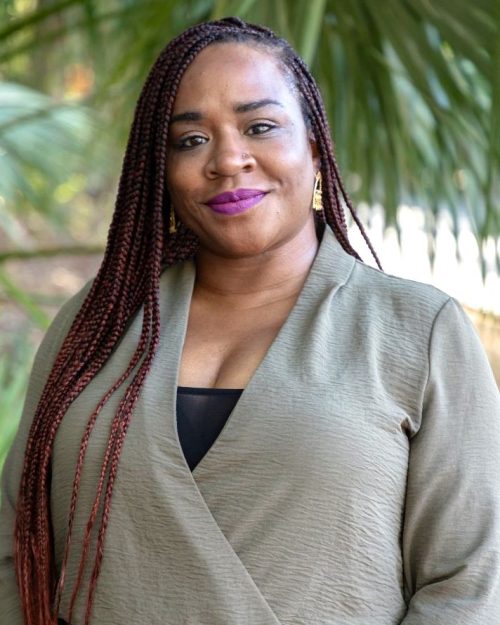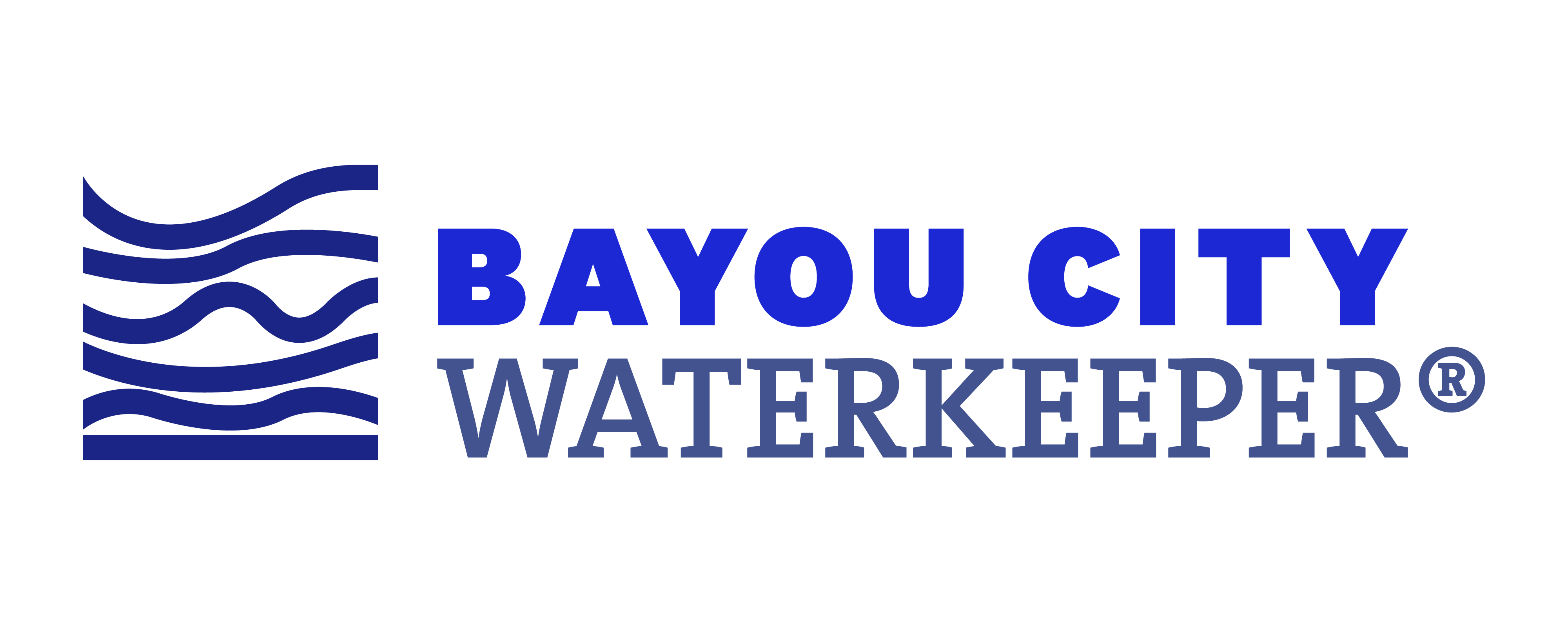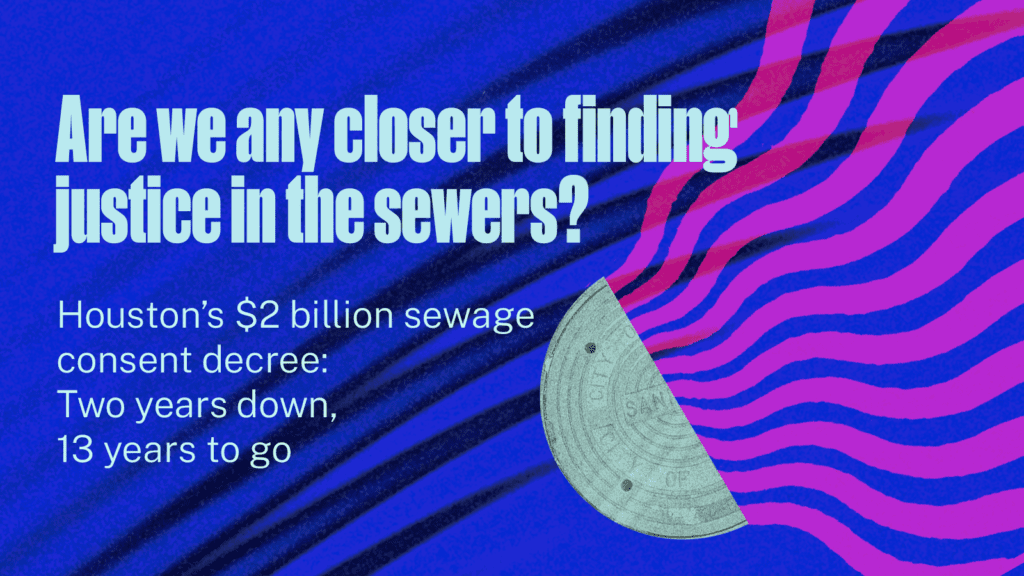Are we any closer to finding justice in the sewers?
Houston’s $2 billion sewage consent decree: Three years down, 12 years to go
Three years have passed since a federal judge in Houston approved a landmark agreement requiring the City of Houston to invest $2 billion in local sanitary sewer upgrades over 15 years. The negotiated settlement, known as a consent decree, resulted from a federal enforcement action prompted by Bayou City Waterkeeper’s investigation in 2018. Our analysis of City of Houston data identified over 9,300 sewage overflows that potentially violated the Clean Water Act and had disproportionate effects on lower-wealth, Black, and brown communities across Houston. The agreement requires the City to meet strict timelines to eliminate releases of untreated sewage into local neighborhoods, parks, and bayous. The City must also pay penalties for ongoing releases in the meantime.
To commemorate the first two years of the consent decree, and understand the on-the-ground effects of this once-in-a-generation investment, we launched resources and tools available on this page. For the third anniversary, we have collaborated with communities affected by sewage problems and our partners Northeast Action Collective and West Street Recovery to develop sewage demands and a policy brief, which you can view in English and Spanish. Over the year ahead, we will be asking the City of Houston to close gaps in sewage investment by creating a fund to support sewage repairs where people need them most: at their homes.
How we got here
Sewage pollution has long been an invisible problem across the Lower Galveston Bay watershed. From 2011 to 2017, wastewater treatment facilities reported more than 13,000 overflows, representing more than 80 million gallons of sewage evading treatment. Houston’s system has been responsible for a large portion of these overflows, and lower-income and Black and brown communities experienced the greatest burden of sewer problems within the city.
In 2018, Bayou City Waterkeeper served the City of Houston with a notice of intent to sue over more than 9,300 of these overflows as violating the Clean Water Act, prompting the U.S. Environmental Protection Agency, joined by the Texas Commission on Environmental Quality, filed a federal enforcement action. In Spring 2021, a federal judge in Texas approved a legal settlement requiring the City of Houston to invest $2 billion in its sanitary sewer system over the next 15 years, or through 2036.
The agreement requires the City to meet strict timelines to eliminate releases of untreated sewage into local neighborhoods, parks, and bayous. The City must also pay penalties for ongoing releases in the meantime. For problems with private sewer laterals, the consent decree focuses on education and enforcement, rather than providing financial assistance for repairing broken sewer lines, as cities like Jackson and St. Louis have done.
Learn more in our story map and timeline video.
Yes, as of 2023, our preliminary analysis shows that the city has completed 35 of the 81 “early action” projects already planned under the consent decree, and 44 more are listed as “in progress” by the city. The city must inspect and assess more than 5,867 miles of gravity sewer mains (which are underground pipes) and has finished inspections of 762.31 miles. The city also must inspect and assess 129,603 manholes across the city and has finished its inspection of 63,791 manholes.
While this represents important progress, this doesn’t represent the full scope of work being done under the consent decree, as this preliminary work, alongside more planning and assessment, will add to the list of what the city must do to bring total sewage overflows across the city down to zero.
We’re seeing progress in other ways. Most notably, as reflected in recent news coverage, a criminal investigation of legal violations at a City of Houston wastewater treatment plant in Kingwood resulting in the revocation of several contracts with the private contractor Inframark is likely the direct result of the consent decree requiring better oversight and enforcement overall.
Watch our summary of the City’s progress, which combines information from the City’s own annual report with our analysis of sewage overflows against demographic and income data.
No. Based on Bayou City Waterkeeper’s analysis of public data from 2013 to 2018, the City of Houston reported more than 9,300 overflows, or approximately 150 per month on average. This number included both problems associated with the public system, as well as problems with private sewer laterals. (This excludes Hurricane Harvey data, when larger-than-average overflows were reported across the watershed, and some sewage plants overtopped or failed.)
This average has seemed to increase through the first two years of the consent decree. While overflows for which the city accepts responsibility total 2,254 over 22 months (averaging approximately 103 per month), private sewer lateral overflows totaled 3,061 over a 14-month period (or 219 per month). This may reflect not a true increase in overflows, but may instead be the result of better tracking and reporting mandated by the consent decree, as well as an increased focus on enforcement, enabling us to understand the true scope of the city’s sewage problem.
Reported volume of overflows has decreased. This may be the direct result of early-action projects under the consent decree that prioritize investments to address overflows associated with wet weather. It is important to recognize that volume may be under-estimated, however, because when volume is unable to be calculated for whatever reason, overflows are listed as having a volume of “0.” In 2021, the city reported that 338 overflows has a volume of zero gallons; in 2022, 671 overflows were listed as having a volume of zero. Further, no volume for overflows is listed for private sewer laterals.
The data confirms this continues to be an environmental justice issue: The neighborhoods during the most overflows are in Northeast Houston and the Gulfton/Wayside area of Houston, which are predominately Black and brown neighborhoods.
Sewer back-ups are often caused by problems with private sewer laterals, the lines connecting homes and businesses to the city’s main system. The consent decree requires the City of Houston to invest $2 billion in long-overdue infrastructure updates, pay $4.4 million in fines for past overflows, and also pay ongoing and future fines as more overflows occur (as they are).
None of this money is going toward an abandoned promise to fund repairs or replacement of the lines connecting homes and businesses to the city’s infrastructure. Instead, the consent decree focuses on education and enforcement, leaving low-income residents to figure out their sewage problems on their own — or potentially face fines of their own. Although the City never explained why, the Trump administration’s whittling down of the use of a policy that made community-centered environmental projects a part of settlements possibly stood in their way. The Biden administration has since removed all obstacles to amending the consent decree to divert ongoing penalties into such a program, but so far, the City has not worked to resolve this gap.
This presents a problem of environmental justice. Private sewer lateral problems concentrate in neighborhoods that are lower-wealth, Blacker, and browner. Without a clear plan to address these problems, Houston’s $2 billion investment will leave these communities behind.
While overflows happen across the city, they disproportionately affect communities that are lower in wealth and less white. This was true before the consent decree was finalized and continues to be true, according to our internal analysis, reflected in the Justice in the Sewers dashboard, created in collaboration with Rice University’s Spatial Studies Lab. This dashboard examines the city’s reports of sewage overflows required by the consent decree, alongside U.S. Census Bureau income and race or ethnicity data.
The Justice in the Sewers dashboard analysis shows that sewer problems across the city continue to disproportionately expose Black, brown, and underinvested communities to unsafe sewage across the city, particularly because of problems associated with private sewer laterals. This is especially troubling because the city has disclaimed any financial responsibility for fixing sewer lateral problems, even when property owners lack resources to make repairs.
For past legal violations underlying the federal enforcement action, the city of Houston agreed to pay $4.4 million penalties, an amount that was divided between the U.S. government and State of Texas. None of this money was reinvested in a local supplemental environmental project.
The city also agreed to pay stipulated penalties for ongoing overflows from its wastewater collection system, in amounts ranging from $300 to $5000 per incident. In a presentation given to City Council’s Transportation, Technology, and Infrastructure committee in March 2022, Carol Ellinger Haddock, Director of Houston Public Works, and Phillip Goodwin, Regulatory Compliance Director of Houston Water explained that the city had been invoiced $293,600 for overflows in fiscal year 2021 and estimated the city would owe another $1.2 million in stipulated penalties for fiscal year 2022. Our understanding is that the city is paying these penalties as they are invoiced. Currently these penalties are being paid to federal and state regulators and not being reinvested in a local supplemental environmental project.
Glossary
The negotiated settlement of a federal enforcement action that works to resolve federal legal violations through a judicially-monitored plan of action that sets clear milestones for performance and stipulates penalties, and may also include supplemental environmental projects to address local harms.
To learn more about the words that we use when talking about our city’s sewers and drains, check out this detailed glossary created by our friends at West Street Recovery in partnership with the Northeast Action Collective.
Explore the Data
Justice in the Sewers map (BCWK map tracking sewage overflows reported under the consent decree against demographic data)
Justice in the Sewers map video explainer (how to use BCWK’s map linked immediately above)
Monthly Poo Reports (BCWK’s monthly update on sewage overflows in Houston)
Media Toolkit and Advisory
Key Media
Key media about Houston sewage problems and the consent decree
Houston Public Works taking over Kingwood wastewater facility amid criminal investigation into release of inadequately treated sewage (Houston Public Media, Mar. 2023)
Talking Sh*t with Bayou City Waterkeeper (City Cast Houston, May 2022)
Houston’s sewer injustices: A decades-long problem only now receiving a solution (BCWK Blog, Apr. 2022)
Justice in the Sewers (CITE Online, Aug. 2021)
Houston water rate increases needed, but must be equitable and transparent (BCWK Blog, June 2021)
Federal judge approves Houston’s $2 billion answer to Clean Water Act lawsuit (Community Impact, Apr. 2021)
Opinion: Reliable Water is a Right: Houston, Don’t Miss This Chance (Houston Chronicle, Feb. 2021)
$2B sewer consent decree will be felt in Houston’s monthly water bills as soon as next spring (Houston Chronicle, Dec. 2020)
Sewer spills put city under EPA scrutiny (Houston Chronicle, Aug. 2016)
Sewage justice across the Lower Galveston Bay watershed
$21M deal will bring Tamina water, sewer services for the first time in its 150 year history (The Courier of Montgomery County, Dec. 2022)
Spill of domestic wastewater monitored (Baytown Sun, Dec. 2022)
Pearland employees violated state water policies, told contractors to dump bleach into Clear Creek (Houston Chronicle, Dec. 2022)
Interview with Bayou City Waterkeeper about Baytown sewage (Houston Public Media, Mar. 2022) (23:30 mark)
City of South Houston to continue testing for mercury in waters downstream of plant (Houston Chronicle, Jan. 2020)
Other resources
Reflections on the Consent Decree

Ayanna Jolivet Mccloud, Executive Director of Bayou City Waterkeeper
We can see that the consent decree has changed the way the City of Houston invests in infrastructure intended to protect our water and human health. We also see that more work is needed. As we continue to monitor the City’s progress and work to close gaps in how the consent decree helps lower-income, Black and brown Houstonians, we remain committed to lifting up community experience and needs, relying on sound science, and using bold legal action when appropriate. By embracing a One Water approach and pulling down federal funds, the City can deliver on the commitment embodied by the consent decree and make clean water a reality for all Houstonians.
 Dr. Robert Bullard, Distinguished Professor of Urban Planning & Environmental Policy and Director, Bullard Center for Environmental & Climate Justice at Texas Southern University; White House Environmental Justice Advisory Council member; known as the father of Environmental Justice:
Dr. Robert Bullard, Distinguished Professor of Urban Planning & Environmental Policy and Director, Bullard Center for Environmental & Climate Justice at Texas Southern University; White House Environmental Justice Advisory Council member; known as the father of Environmental Justice:
Water infrastructure in Houston and throughout the U.S. has suffered from disinvestment over decades, and now is a chance to get it right. Your zip code is still one of the strongest predictors of health and well-being and a powerful predictor of who gets polluted and who gets protected. If a community happens to be poor, working class or inhabited largely by people of color, it receives less protection, as we see this in the occurrence of these sewage overflows. You tell me your zip code and I can tell you how healthy you are and how healthy that residential community is.
This consent decree is a needed step, but additional funds must be pulled down, especially with historic federal investments prioritizing environmental justice communities through the Infrastructure Investment and Jobs Act. Houston needs to be able to access these federal funds through the State to truly leverage the consent decree toward transformational investments in frontline communities. Now is the time to fix decades of unequal distribution of resources through the consent decree and pull down historic water infrastructure funds, prioritizing justice for our city.
 Catherine Coleman Flowers, public health researcher and community advocate; Vice Chair, White House Environmental Justice Advisory Council; 2022 MacArthur “Genius” fellow; Founding director of the Center for Rural Enterprise and Environmental Justice; and author of “Waste: One Woman’s Fight Against America’s Dirty Secret”:
Catherine Coleman Flowers, public health researcher and community advocate; Vice Chair, White House Environmental Justice Advisory Council; 2022 MacArthur “Genius” fellow; Founding director of the Center for Rural Enterprise and Environmental Justice; and author of “Waste: One Woman’s Fight Against America’s Dirty Secret”:
I am glad to see the City of Houston making great strides to address failing water systems through the $2 billion consent decree over the past two years. I applaud the Bayou City Waterkeeper and other environmental justice organizations for holding the city accountable in ensuring that these funds support the improvement of sewage treatment systems in all communities – particularly low-income communities. The key to being a good environmental neighbor is to include local solutions with resilient and climate friendly technologies, along with involvement of impacted residents. Holding accountable local, state and federal governments is important in our work to resolve sewage and wastewater issues that disproportionately impact marginalized and low-income communities.
 Felix Kapoor, Co-Director of Home Repair and Community Organizing, West Street Recovery:
Felix Kapoor, Co-Director of Home Repair and Community Organizing, West Street Recovery:
Across Northeast Houston families and communities they are part of are still facing the impacts of decades of inadequate investment in sewer systems in BIPOC neighborhoods. The impacts are compounded by the treacherous storms which places more pressure on the aging and neglected sewer infrastructure. Homeowners struggle to afford the repairs and upkeep caused by dysfunctional sewer systems that cause toilets to bubble during heavy rains. And, the whole community faces health risks for sewage that is spread by flood waters. In the last 5 years, WSR has helped dozens of families repair sewer systems that were contaminating water and soil in the communities they love and call home. Families that have faced discrimination and decades of racist policy need help to make critical repairs to sewer systems, and the health of all of us, the safety of our environment and the quality of our lives depends on it.
 Julia Orduña, Southeast Texas Regional Director, Texas Housers:
Julia Orduña, Southeast Texas Regional Director, Texas Housers:
Texas Housers has worked for years to reverse the drainage inequity that exists in Houston between wealthy white neighborhoods and low-income BIPOC communities. As we reach the two-year anniversary of the consent decree signing which promises $2 billion in infrastructure repairs, we reflect on the compounding injustices that continue to affect the health and safety of our BIPOC communities. Dignified housing means adequate stormwater and sewage infrastructure – this cannot be separated. Dignified housing also means adequate protection against flood risk. Through BCWK’s analysis, we can see systemwide failures that critically and consistently affect low-income, BIPOC communities and the need to replace aging infrastructure. Work to specifically identify and fix issues that affect these communities of color more acutely must be mandated in the consent decree going forward.
 Stefania Tomaskovic, Coalition Director, Coalition for Environment, Equity, and Resilience:
Stefania Tomaskovic, Coalition Director, Coalition for Environment, Equity, and Resilience:
Protecting our bayous from sewage overflows protects our water and our health. The consent decree with the City of Houston is an important step toward water justice. As our communities continue to confront climate change through storms and flooding, our elected officials must do more to protect all communities, especially Black and brown communities who are most at risk from contamination from stormwater pollution and sewage overflows.
Take Action
Over the month of April, we’ll be sharing resources to help communities understand sewage injustices across Houston and take action. These include:
- Understanding your sewage system
- A community action guide
- Water bill assistance resource guide
- A legal resource guide
- Timeline of sewage treatment in Houston
- Story map of sewer disinvestment across Houston
- A summary of progress reported by the City under the consent decree
- Data updates to our Justice in the Sewers map

